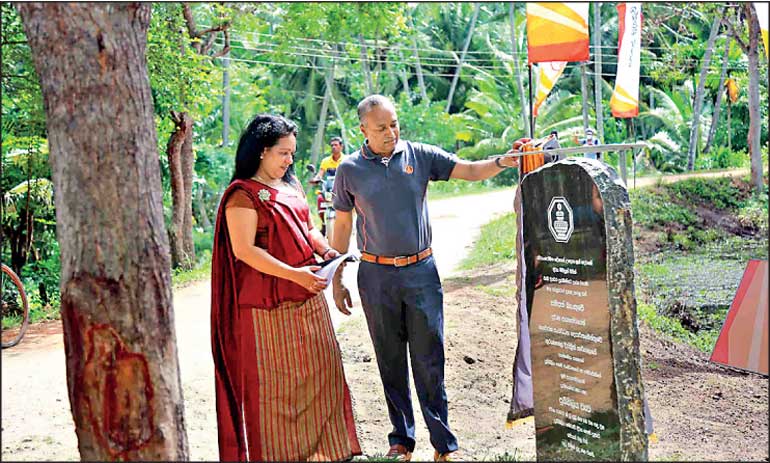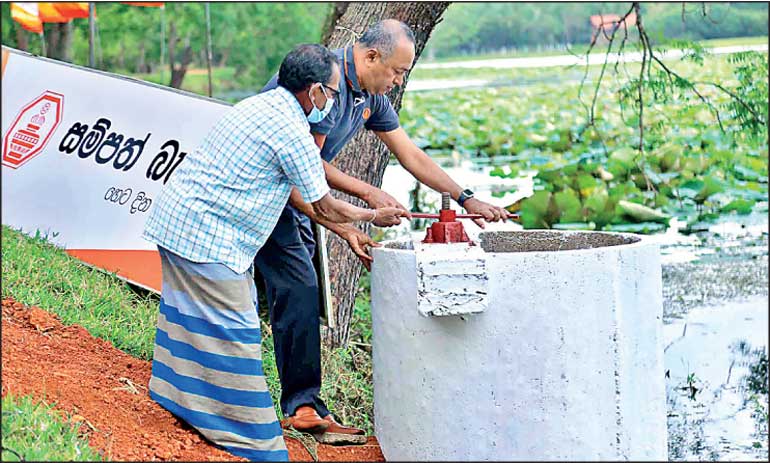Tuesday Feb 17, 2026
Tuesday Feb 17, 2026
Saturday, 3 September 2022 00:05 - - {{hitsCtrl.values.hits}}

Sampath Bank Chief Human Resource Officer Dr. Lalith Weragoda and Kurunegala District Office Department of Agrarian Development Deputy Commissioner Dushani M. Weerawansha unveiling a commemorative plaque

Sampath Bank Chief Human Resource Officer Dr. Lalith Weragoda and Pubbiliya Farmers’ Association President Kiribandiya opening the sluice gate
Sampath Bank recently handed over restored Pubbiliya Wewa, a 45-acre tank in Pubbiliya, Kurunegala District at a ceremony attended by bank officers, members of the executive committee of the local farmers association, villagers, and officials from the Department of Agrarian Development’s Kurunegala District Office. This project involved restoring the tank spill and removing layers of accumulated sludge that had built up over decades of neglect.
Pubbiliya Wewa, located about six kilometres northeast of Kobeigane, will irrigate over 210 acres of prime paddy lands. Over 160 farming families, comprising of more than 500 men, women and children, stand to directly benefit. Additionally, the ripple effects of the restoration will bestow economic benefits on five neighbouring villages as well.
The Pubbiliya Wewa Restoration Project is part of the ‘Wewata Jeewayak’ (Life to Tanks), Sampath Bank’s flagship Corporate Social Responsibility (CSR) initiative. Begun more than 20 years ago, Wewata Jeewayak is a committed, coordinated effort to rebuild and restore the traditional irrigation network and thus ensure a dependable supply of water for dry zone farmers to cultivate their paddy lands and reap the harvests of both the Yala and Maha paddy seasons.
Wewata Jeewayak is congruent with what business schools call the triple bottom line. It’s a value system based on the belief that instead of focusing solely on their financial performance, firms should commit to measuring their social and environmental impact on the ‘Three Ps’ – People, Planet and Profit as well. It’s aligned with the United Nations Sustainable Development Goals (UNSDGs). In a nutshell, to improve the livelihood of the community (People), increase the water capacity of the tank (Planet), enrich the surrounding ecosystem (Planet), contribute to the national GDP (Profit), and empowering local agricultural entrepreneurs (People and Profit).
At the handing-over ceremony, Sampath Bank officers thanked the Pubbiliya Govi Sanvidhanaya (Farmers’ Association) for their wholehearted contribution. The bank also thanked the representatives of the Department of Agrarian Development’s Kurunegala District Office for their invaluable technical support.
“Restoring the Dry Zone’s water-dependent ecosystems mean that farmers can cultivate paddy in both the Yala and Maha seasons, and contribute to the nation’s food security. This is very much a topic of concern in the present day. Tank restoration enriches the country’s biodiversity profile as well, when regional fauna and flora start flourishing again. So, the benefits are truly multifold,” said Sampath Bank PLC Executive Director/Chief Financial Officer Ajantha De Vas Gunasekera.
“It’s very gratifying to see a bank taking an interest in the agricultural economy, and getting actively involved in restoring ancient tanks,” said Pubbiliya Govi Sanvidanaya President Kiribandiya. “Speaking as farmers, we understand how important it is to make the country self-sufficient in food. Committed long-term efforts such as Sampath Bank’s Wewata Jeewayak program will help us accomplish that goal.”
Despite the obstacles currently faced by the banking sector in Sri Lanka, Sampath Bank has successfully maintained all its capital ratios well above regulatory requirements throughout Q1 2022. All the while, Sampath Bank has implemented all Government-led moratorium schemes for eligible customer segments affected by the pandemic. The bank’s digitalisation strategy has also continued to prove its worth during these trying times by securing a more accessible and safer banking experience for customers.